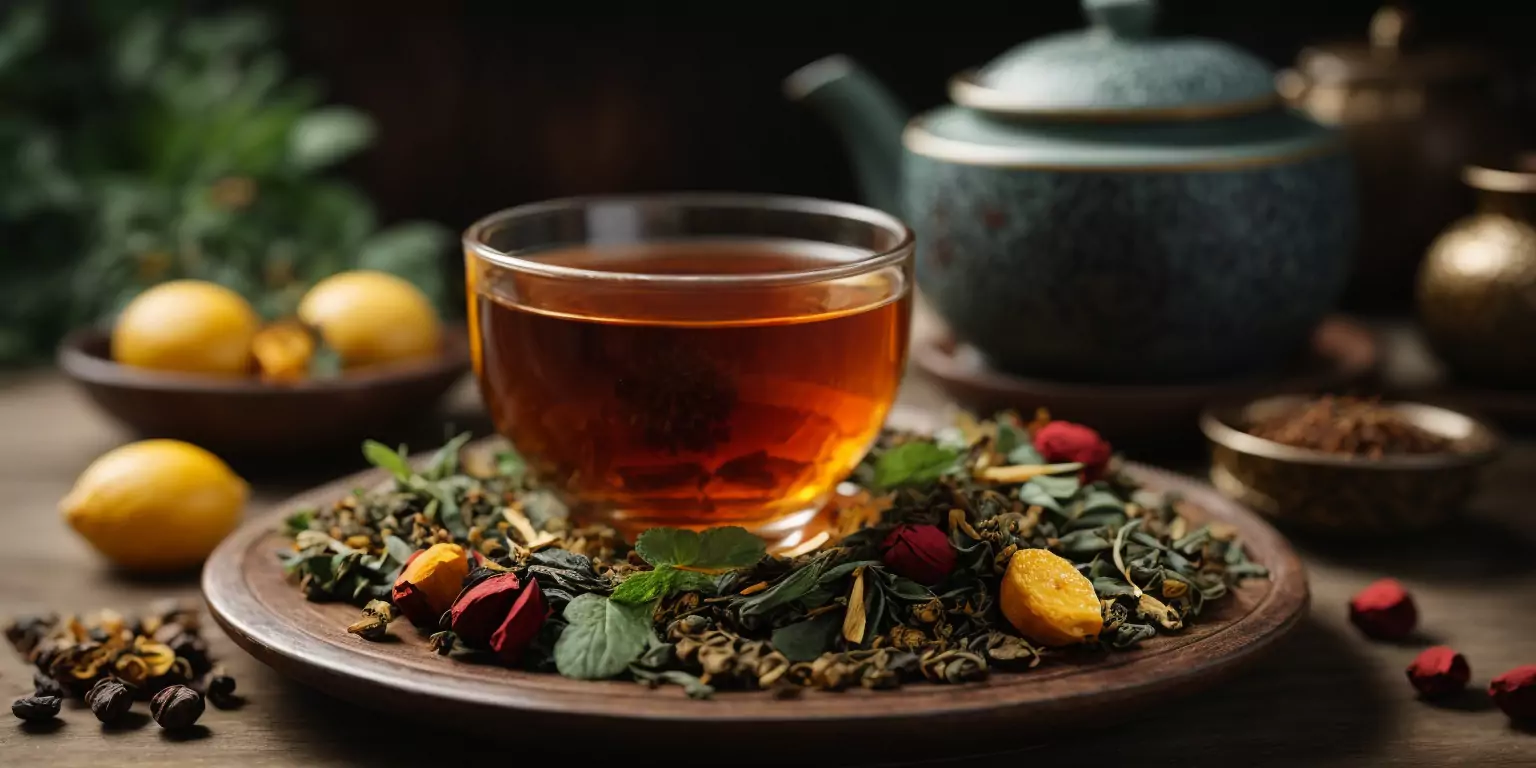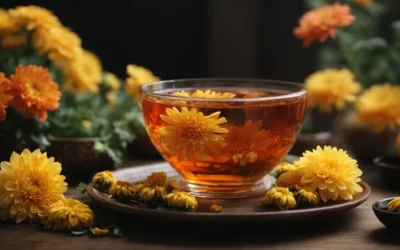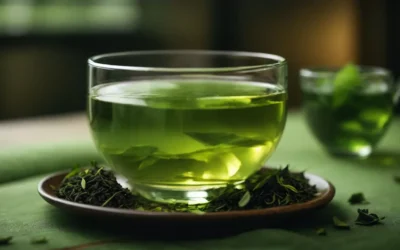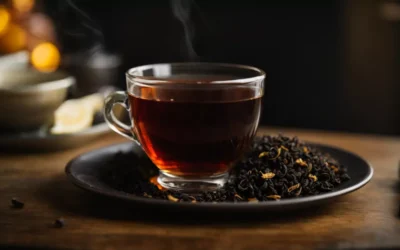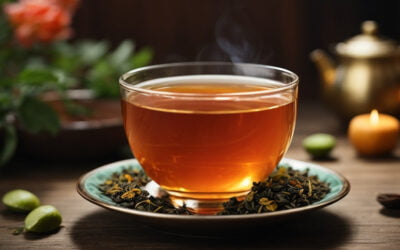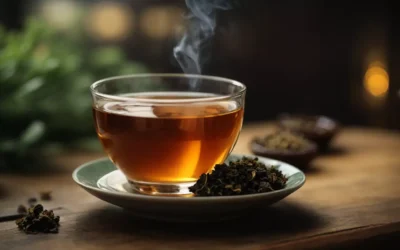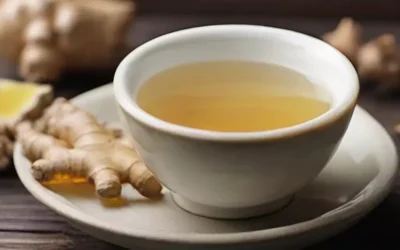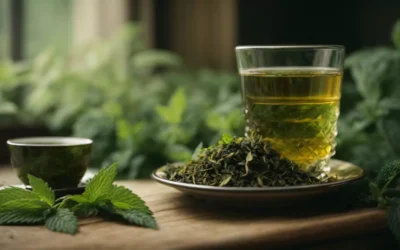Chinese herbal tea, also known as tisane, has been captivating people for centuries with its rich history and unique properties. This soothing beverage offers a refreshing alternative to traditional teas, made from various plant ingredients that provide delightful flavors and a plethora of health benefits.
One commonly used ingredient in Chinese herbal tea is sesame, which adds a distinct flavor and aroma to the drink. The tisane is made by infusing the seeds of herbs and plants, resulting in a sweet and refreshing beverage. But what makes Chinese herbal tea so special? Let’s dive into the introduction of this flavorful and healthy drink!
- Health Benefits of Caffeine-Free Herbal Teas
- The Rich Tradition of Ba Bao Cha
- Medicinal Properties of Specific Chinese Herbs
- Seasonal Herbal Teas for Health
- The Role of Chinese Herbal Teas in Digestion
- Tea for Cold, Fever, and Headache
- Spotlight on Dandelion: A Versatile Herb
- The Intersection of Traditional Chinese Medicine and Herbal Tea
- Preparing Chinese Herbal Tea at Home
- Finding Quality Chinese Herbal Teas Online
- Conclusion
- FAQs
Features
Chinese herbal tea stands out for its unique features:
Features | Description |
|---|---|
Refreshing Alternative | Offers a delightful alternative to traditional teas |
Rich History | Has a long-standing history in Chinese culture |
Unique Properties | Contains distinct flavors and aromas from various plant ingredients |
Pros and Cons
Like any other drink, Chinese herbal tea has its pros and cons:
Pros | Cons |
|---|---|
Natural Healing Properties | Some flavors may not be appealing to everyone |
Promotes Digestion | Requires proper knowledge of ingredients for optimal benefits |
Boosts Immunity | May interact with certain medications |
Soothes Stress and Headaches | May not be suitable for pregnant or breastfeeding women |
Differences
Chinese herbal tea differs from other beverages in several ways:
Differences | Description |
|---|---|
Ingredients | Made from various plant ingredients, including sesame |
Preparation | Infused by steeping herbs and plants |
Health Benefits | Offers natural healing properties for digestion, immunity, stress relief, and more |
Now that we’ve covered the features, pros and cons, as well as the differences of Chinese herbal tea, it’s clear why this drink has gained popularity worldwide. As more people seek natural remedies and holistic approaches to wellness, Chinese herbal tea provides a flavorful and healthy option.
Chinese herbal tea is deeply rooted in ancient Chinese medicine and has stood the test of time. Each herb used in its preparation serves a specific purpose, whether it’s soothing stress, relieving headaches, improving overall well-being, or regulating internal heat. This drink offers a natural way to address different health concerns.
So why not give Chinese herbal tea a try? Visit our shop to experience the healing properties of this internal heat-inducing drink. With its delightful flavors and natural benefits, Chinese herbal tea is sure to leave you refreshed and satisfied. Cheers to good health!
Health Benefits of Caffeine-Free Herbal Teas
Refreshing Alternative to Traditional Caffeinated Beverages
Caffeine-free herbal teas offer a delightful and invigorating substitute for your usual caffeinated drinks. Whether you’re tired of the jitters or simply seeking a non-stimulating drink option, these herbal teas provide a refreshing alternative to traditional beverages. With their wide range of flavors and aromas, drinks can satisfy your taste buds while keeping you hydrated throughout the day.
Improved Digestion
One of the significant health benefits of caffeine-free herbal teas is their positive impact on digestion. These herbal teas are a great drink for promoting healthy digestion. Many herbal teas, such as peppermint and ginger tea, have been known to aid in soothing an upset stomach, relieving bloating, and promoting healthy digestion. These natural remedies can be especially helpful after a heavy meal or when experiencing digestive discomfort.
Relaxation and Stress Relief
In today’s fast-paced world, finding ways to relax and unwind is crucial for our overall well-being. Caffeine-free herbal teas like chamomile, lavender, and lemon balm are renowned for their calming properties. Sipping on a warm cup of these soothing brews can help alleviate stress, promote relaxation, and even improve sleep quality. Incorporating these herbal teas into your daily routine can be an excellent way to find moments of tranquility amidst the chaos.
Suitable for Individuals Sensitive to Caffeine
For those who are sensitive to caffeine or prefer to avoid it altogether, caffeine-free herbal teas are the perfect choice. Unlike traditional caffeinated beverages like coffee or black tea, these herbal infusions do not contain any caffeine content. This makes them ideal for individuals who experience adverse effects from consuming caffeine or those who want to limit their intake without compromising on flavor.
Rich in Antioxidants
Herbal teas are often packed with antioxidants that can benefit our health in various ways. Antioxidants help protect our cells from damage caused by free radicals, which are unstable molecules in the body. Many herbal teas, such as green tea and hibiscus tea, are known for their high antioxidant content. Including these teas in your daily routine can contribute to overall well-being and support a healthy immune system.
Hydration with Flavor
Staying properly hydrated is essential for maintaining optimal health. While plain water may sometimes feel monotonous, caffeine-free herbal teas provide a flavorful way to stay hydrated throughout the day.
The Rich Tradition of Ba Bao Cha
Ba Bao Cha is a famous Chinese herbal tea blend that has been enjoyed for centuries. This tea is known for its nourishing effects on the body and combines eight precious ingredients to create a harmonious and flavorful drink.
Eight Precious Ingredients
Ba Bao Cha gets its name from the eight precious ingredients it contains. These ingredients include dried longan, red dates, goji berries, dried lotus seeds, dried lily bulbs, dried white fungus, rock sugar, and water chestnuts. Each ingredient brings its own unique flavor and health benefits to the tea.
Centuries of Enjoyment
The tradition of drinking Ba Bao Cha dates back many centuries in China. It was believed to have originated during the Song Dynasty and has since become a popular beverage throughout the country. People would often brew this tea during special occasions or as a daily tonic to promote overall well-being.
Nourishing Effects on the Body
One of the reasons why Ba Bao Cha has stood the test of time is because of its nourishing effects on the body. Each ingredient in this herbal blend offers specific health benefits. For example, dried longan is known for promoting relaxation and improving sleep quality. Red dates are rich in antioxidants and can help boost energy levels. Goji berries are packed with vitamins and minerals that support immune function.
Harmonious Flavor Profile
What sets Ba Bao Cha apart from other herbal teas is its harmonious flavor profile. The combination of sweet, nutty, and floral notes creates a balanced taste that appeals to many palates. The rock sugar adds a touch of sweetness without overpowering the natural flavors of the herbs.
Brewing Tips
To enjoy Ba Bao Cha at its best, it’s important to follow proper brewing techniques. Start by rinsing all the ingredients under cold water to remove any impurities. Then, add them to a pot with water and bring it to a boil. Reduce the heat and let the tea simmer for about 30 minutes to allow the flavors to infuse. Finally, strain the tea and serve it hot or chilled.
Medicinal Properties of Specific Chinese Herbs
Chinese herbal tea has been used for centuries for its various medicinal properties. Different herbs used in these teas possess specific benefits that can target different health concerns. Understanding the medicinal properties of specific herbs allows you to choose teas that cater to your individual needs.
Chrysanthemum: Reducing Inflammation and Promoting Eye Health
Chrysanthemum is a popular herb used in Chinese herbal tea known for its ability to reduce inflammation and promote eye health. This vibrant flower contains antioxidants and anti-inflammatory compounds that can help alleviate symptoms of conditions like arthritis and allergies. Chrysanthemum tea is believed to have a cooling effect on the body, making it a great choice during hot summer months to combat heat-related inflammation.
Peppermint: Soothing Digestive Discomfort
Peppermint is another commonly used herb in Chinese herbal teas, renowned for its soothing effects on the digestive system. It contains menthol, which helps relax the muscles of the gastrointestinal tract, relieving symptoms such as bloating, gas, and stomach cramps. Peppermint tea can also aid digestion by increasing bile flow and reducing nausea.
Ginseng: Boosting Energy and Enhancing Cognitive Function
Ginseng is a powerful herb known for its energizing properties. It has been traditionally used in Chinese medicine to improve vitality and enhance cognitive function. Ginseng tea can provide a natural energy boost without the jitters associated with caffeine consumption. It may also help improve mental clarity, concentration, and memory.
Dandelion Root: Supporting Liver Health
Dandelion root is often included in Chinese herbal teas due to its potential benefits for liver health. It contains compounds that stimulate bile production and support liver detoxification processes. Drinking dandelion root tea may help improve liver function by promoting the elimination of toxins from the body.
Goji Berry: Boosting Immune Function
Goji berries are packed with antioxidants and immune-boosting properties, making them a popular ingredient in Chinese herbal tea. These berries contain high levels of vitamin C, which can help strengthen the immune system and protect against common illnesses like colds and flu. Goji berry tea is also believed to have anti-aging benefits due to its antioxidant content.
By understanding the specific medicinal properties of different Chinese herbs, you can select herbal teas that align with your health goals.
Seasonal Herbal Teas for Health
Different seasons bring about changes in weather, and with these changes come different needs for our bodies. One way to support our overall well-being is by incorporating seasonal herbal teas into our daily routines. These herbal teas can help us adapt to the changing weather conditions and optimize our health.
Winter Blends: Warming the Body
During the winter months, when the temperatures drop and cold winds blow, it’s important to keep our bodies warm and cozy. Winter blends of herbal teas can help achieve this goal. One popular option is ginger tea, which not only warms the body but also provides numerous health benefits. Ginger has been used for centuries in traditional Chinese medicine for its anti-inflammatory properties and its ability to aid digestion. Sipping on a hot cup of ginger tea can help soothe an upset stomach and provide relief from cold symptoms.
Another winter favorite is cinnamon tea. Cinnamon is known for its warming properties and its ability to improve blood circulation. It can also help regulate blood sugar levels and boost metabolism. By incorporating cinnamon tea into your winter routine, you can keep your body warm from within while enjoying a delicious and comforting beverage.
Summer Blends: Cooling Down
When summer arrives with its scorching heat, it’s essential to find ways to cool down our bodies. This is where summer blends of herbal teas come into play. Mint tea is a refreshing option that not only cools the body but also aids digestion and freshens breath. Peppermint, spearmint, or even a blend of both can be used to make a delightful cup of mint tea that will help beat the heat.
Hibiscus tea is another popular choice during the summer months due to its cooling effects on the body. Not only does hibiscus tea have a tangy flavor that quenches thirst, but it also contains antioxidants that promote heart health and lower blood pressure. Enjoying a glass of hibiscus tea over ice can be a delicious way to stay cool and hydrated during the summer heat.
Adaptation and Optimization
By selecting seasonal herbal teas, we can adapt to the changing weather conditions and optimize our health throughout the year. These teas provide not only a flavorful experience but also various health benefits that align with our body’s needs in different seasons. Whether it’s warming ginger tea in winter or refreshing mint tea in summer, incorporating these herbal blends into our daily routines can support our overall well-being.
The Role of Chinese Herbal Teas in Digestion
Chinese herbal teas have been used for centuries to support digestion and provide relief from digestive issues. These teas contain a blend of herbs that are known for their soothing properties and ability to alleviate discomfort. Ginger, licorice, and peppermint are some of the key herbs commonly found in Chinese herbal teas that can help soothe the stomach and promote a healthy digestive system.
Soothing the Stomach with Ginger, Licorice, and Peppermint
One of the main reasons why Chinese herbal teas are effective in supporting digestion is because they often contain ingredients like ginger, licorice, and peppermint. Ginger has long been used as a natural remedy for nausea and indigestion. It helps to relax the muscles in the gastrointestinal tract, allowing food to move more smoothly through the digestive system. Licorice, on the other hand, can help reduce inflammation in the stomach lining and alleviate symptoms such as acid reflux or heartburn. Peppermint is another herb commonly used in Chinese herbal teas due to its ability to relax the muscles of the gastrointestinal tract, easing symptoms like bloating and stomach cramps.
Alleviating Digestive Discomfort
Chinese herbal teas can be particularly beneficial for those experiencing digestive discomfort. Whether it’s due to overeating or consuming foods that don’t agree with your stomach, these teas can provide relief by calming inflammation and promoting healthy digestion. By incorporating these teas into your routine, you may experience reduced bloating, improved bowel movements, and overall better digestion.
Promoting a Healthy Digestive System
In addition to providing immediate relief from digestive issues, Chinese herbal teas also play a role in promoting long-term digestive health. Regular consumption of these teas can help maintain a healthy balance of gut bacteria and improve nutrient absorption. They also support liver function by aiding detoxification processes in the body.
By incorporating Chinese herbal teas into your daily routine, you can support your digestive system and alleviate common discomforts. However, it’s important to note that while these teas are generally safe, individual reactions may vary. It’s always a good idea to consult with a healthcare professional before incorporating any new herbal remedies into your routine, especially if you have underlying health conditions or are taking medications.
Tea for Cold, Fever, and Headache
Chinese herbal teas have long been used as natural remedies for various ailments. Fevers, and headaches, these teas can provide soothing relief without the need for over-the-counter medications. Let’s explore how Chinese herbal teas can help alleviate these discomforts.
Cold Relief
When you’re feeling under the weather with a cold, sipping on a cup of Chinese herbal tea can work wonders. Many herbal teas contain ingredients like ginger, mint, and licorice root that possess natural antiviral and antibacterial properties. These components help boost your immune system and alleviate symptoms such as congestion, sore throat, and coughing.
For instance, ginger tea is known for its warming effect on the body and can help relieve nasal congestion and reduce inflammation in the respiratory system. Peppermint tea is another popular choice that can soothe a sore throat and clear up sinus congestion. By incorporating these teas into your daily routine when you have a cold, you may experience faster recovery time and reduced symptoms.
Fever Reduction
When your body temperature rises due to fever, staying hydrated is crucial. Drinking Chinese herbal teas not only helps keep you hydrated but also aids in reducing fever symptoms naturally. Some herbs commonly found in these teas have cooling properties that promote sweating while lowering body temperature.
Herbs like chrysanthemum flowers are often used in Chinese herbal teas to combat fever by promoting heat dissipation from the body. Honeysuckle flower tea has been traditionally used to reduce fever symptoms such as headache or body aches associated with viral infections.
By sipping on these refreshing herbal teas during a fever episode instead of relying solely on medication, you give your body an opportunity to heal naturally while providing comfort through hydration.
Headache Relief
Headaches can be debilitating and affect our daily lives significantly. Instead of reaching for painkillers, consider trying Chinese herbal teas for headache relief. Some herbs like lavender and chamomile have calming properties that can help relax the mind and alleviate tension headaches.
Peppermint tea has been shown to provide relief from migraines due to its ability to improve blood circulation and reduce inflammation. By incorporating these teas into your routine, you may find relief from headaches without the side effects often associated with pain medications.
Spotlight on Dandelion: A Versatile Herb
Dandelion, a versatile herb commonly found in Chinese herbal teas, offers a multitude of health benefits. This herb is not just your average weed; it packs a powerful punchAiding digestion, and promoting detoxification in the body.
Liver Support and Detoxification
Dandelion has long been recognized for its ability to support liver health. The liver plays a crucial role in detoxifying the body by filtering out harmful substances. Dandelion contains compounds that can help protect the liver from damage caused by toxins and oxidative stress. It also stimulates the production of bile, which aids in the digestion and absorption of fats.
Digestive Aid
If you’re experiencing digestive issues like bloating or indigestion, dandelion may come to your rescue. This herb acts as a natural diuretic, helping to eliminate excess water and reduce bloating. It also stimulates appetite and promotes healthy digestion by increasing the production of stomach acid and enzymes.
Versatility in Traditional Recipes
Dandelion’s versatility makes it an essential ingredient in many traditional Chinese recipes. Its leaves can be used as a nutritious addition to salads or cooked as greens. The roots are often roasted and ground to make a caffeine-free coffee substitute with a similar flavor profile. Dandelion flowers can be used to make tea or infused into oils for skincare purposes.
Nutritional Powerhouse
Beyond its medicinal properties, dandelion is packed with essential nutrients that contribute to overall well-being. It is rich in vitamins A, C, E, K, calcium, iron, potassium, magnesium, and zinc. These nutrients play vital roles in supporting immune function, maintaining bone health, regulating blood pressure levels, and promoting healthy skin.
Incorporating Dandelion into Your Routine
There are various ways you can incorporate dandelion into your daily routine. One option is to enjoy dandelion tea, which can be found in health food stores or made at home using dried dandelion leaves or flowers. You can also find dandelion supplements available in capsule or liquid form.
It’s important to note that while dandelion is generally safe for consumption, it may interact with certain medications or cause allergic reactions in some individuals. As always, consult with a healthcare professional before adding any new herbs or supplements to your routine.
The Intersection of Traditional Chinese Medicine and Herbal Tea
Chinese herbal tea has a deep connection with traditional Chinese medicine (TCM). In TCM, the focus is on maintaining balance within the body, and specific herbs are used to address imbalances or promote overall wellness. By incorporating TCM principles into the consumption of herbal tea, you can enhance its therapeutic effects.
Chinese Herbal Tea and TCM Principles
Traditional Chinese medicine views the body as an interconnected system where imbalances can lead to various health issues. To restore balance, TCM practitioners prescribe specific herbs based on individual needs. Similarly, Different blends are created using specific herbs known for their unique properties.
Addressing Imbalances through Herbal Tea
One of the key aspects of TCM is identifying imbalances in the body and addressing them accordingly. Whether it’s a deficiency or excess of certain elements, herbal teas can be tailored to target these imbalances. For example, if someone experiences digestive issues due to excessive heat in their body according to TCM principles, they might benefit from drinking cooling herbal teas that contain ingredients like chrysanthemum or mint.
Promoting Overall Wellness
In addition to addressing imbalances, Chinese herbal tea is also used in TCM for promoting overall wellness. Many herbs have adaptogenic properties that help the body cope with stress and improve vitality. Drinking herbal teas regularly can support immune function, improve digestion, and boost energy levels.
Enhancing Therapeutic Effects
When you combine the knowledge of TCM with herbal tea consumption, you can enhance its therapeutic effects. By understanding your own constitution or seeking guidance from a qualified practitioner, you can choose blends that align with your specific needs. This personalized approach allows you to harness the full potential of Chinese herbal tea.
Exploring Different Blends
Chinese herbal teas come in a wide variety of blends that cater to different health concerns and preferences. From calming teas that aid in sleep to detoxifying blends that support liver function, there is a blend for almost every need. Exploring different blends allows you to discover the ones that work best for you and your unique wellness goals.
Preparing Chinese Herbal Tea at Home
Simple and Rewarding
Brewing your own Chinese herbal tea at home is a simple and rewarding experience. You don’t have to be an expert in traditional Chinese medicine to enjoy the benefits of these flavorful concoctions. With a few basic ingredients and some easy-to-follow instructions, you can create your own soothing brews that promote wellness and relaxation.
Optimal Flavor and Benefits
To achieve optimal flavor and reap the full benefits of each herb or blend, it’s important to follow specific instructions for brewing. Different herbs require different methods to extract their unique properties. Some herbs are best steeped in hot water, while others benefit from decoction—a process where the herbs are simmered for a longer period of time.
Experiment with Brewing Methods
Don’t be afraid to experiment with different brewing methods to find what works best for you. Steeping is the most common method used for brewing Chinese herbal tea. Simply add your desired amount of herbs or tea bags to hot water, let them steep for the recommended time, then strain before drinking.
Decoction, on the other hand, involves boiling raw herbs in water for an extended period of time. This method allows for a more concentrated infusion that may offer stronger therapeutic effects. It requires a bit more time and effort but can be worth it if you’re looking for a potent brew.
The Importance of Raw Herbs
When preparing Chinese herbal tea at home, using high-quality raw herbs is crucial. Raw herbs are unprocessed botanicals that retain their natural properties and flavors. They come in various forms—dried leaves, roots, flowers, or seeds—and can be purchased from reputable suppliers or specialty stores.
Using raw herbs not only ensures authenticity but also allows you to customize your blends according to your needs and preferences. You can mix different herbs together or focus on one specific herb depending on your desired outcome—whether it’s to boost immunity, improve digestion, or promote relaxation.
Embrace the Art of Tea Making
Brewing Chinese herbal tea is not just about making a beverage—it’s an art form that connects you with centuries-old traditions and promotes mindfulness. Take the time to appreciate the aromas, colors, and flavors as you prepare your tea. Allow yourself to be fully present in the moment and savor each sip.
By brewing your own Chinese herbal tea at home, you have control over what goes into your cup.
Finding Quality Chinese Herbal Teas Online
The internet offers a wide range of options. With just a few clicks, you can explore an extensive selection of teas from the comfort of your own home. However, it’s important to know how to navigate this vast virtual marketplace and ensure that you are getting authentic and premium teas. Here are some tips to help you find the best Chinese herbal teas online:
Reputable Online Retailers
One of the first things you should do is look for reputable online retailers that specialize in Chinese herbal teas. These retailers often have a dedicated section for Chinese teas and source their products from trusted suppliers. By purchasing from these established sellers, you can have confidence in the quality and authenticity of the teas they offer.
Customer Reviews
Reading customer reviews can be incredibly helpful in determining the quality of Chinese herbal teas available online. Real-life experiences shared by other tea enthusiasts can give you insights into the taste, aroma, and overall satisfaction with a particular tea product. Look for detailed reviews that provide specific information about flavor profiles, brewing instructions, and any potential side effects.
Certifications
Another important factor to consider when purchasing Chinese herbal teas online is certifications. Look for products that have been certified by reputable organizations or regulatory bodies to ensure that they meet certain standards of quality and safety. Common certifications include organic certification, fair trade certification, and GMP (Good Manufacturing Practices) certification.
Authenticity
Authenticity is crucial. To ensure you are getting genuine tea products, check if the retailer provides information about the origin of their teas and their sourcing practices. Transparent communication regarding where and how the tea is grown can give you peace of mind knowing that you are purchasing authentic Chinese herbal teas.
Variety and Selection
A great advantage of shopping for Chinese herbal teas online is the vast variety and selection available. You can explore different types of teas such as green tea, oolong tea, pu-erh tea, and more. Online retailers often offer blends that combine various herbs and ingredients to create unique flavors and health benefits. Take advantage of this wide range of options to find teas that suit your taste preferences and specific wellness needs.
Conclusion
In conclusion, Chinese herbal teas offer a myriad of health benefits and have a rich tradition rooted in traditional Chinese medicine. From promoting digestion to relieving cold and fever symptoms, these teas have been used for centuries to support overall well-being. The medicinal properties of specific Chinese herbs, such as dandelion, make them versatile ingredients in herbal tea blends.
To fully experience the benefits of Chinese herbal teas, it is important to find high-quality products from reputable sources. Online platforms provide a convenient way to explore and purchase a wide variety of teas. Whether you are looking to address specific health concerns or simply enjoy the flavors and aromas of herbal teas, incorporating these beverages into your daily routine can be a valuable addition to your holistic wellness journey.
FAQs
What is Chinese herbal tea?
Chinese herbal tea is a type of beverage made from various traditional Chinese herbs and plants. It has been used for centuries in Chinese medicine for its potential health benefits. These teas are often brewed by steeping the herbs in hot water, resulting in a fragrant and flavorful drink.
Is Chinese herbal tea safe to consume?
When consumed in moderation, Chinese herbal tea is generally considered safe for most people. However, it’s important to note that some herbs may have specific contraindications or interactions with certain medications. If you have any underlying health conditions or are taking medications, it’s advisable to consult with a healthcare professional before incorporating Chinese herbal tea into your routine.
What are the potential health benefits of drinking Chinese herbal tea?
Chinese herbal tea is believed to offer various health benefits due to the properties of the herbs used. These potential benefits may include boosting immunity, improving digestion, reducing inflammation, promoting relaxation, aiding weight management, and supporting overall well-being. However, scientific research on these claims is limited, and individual results may vary.
How do I prepare Chinese herbal tea?
To prepare Chinese herbal tea, start by selecting your desired combination of herbs based on their intended effects or flavors. Generally, you can use around 1-2 teaspoons of dried herbs per cup of hot water. Allow the herbs to steep in hot water for about 5-10 minutes before straining and enjoying your aromatic cup of Chinese herbal tea.
Where can I buy authentic Chinese herbal tea?
Authentic Chinese herbal teas can be purchased from reputable specialty stores that specialize in traditional Chinese medicine or herb shops. Online platforms also offer a wide range of options for purchasing authentic Chinese herbal teas. Ensure that you choose reliable sources that provide high-quality products and have positive customer reviews.

